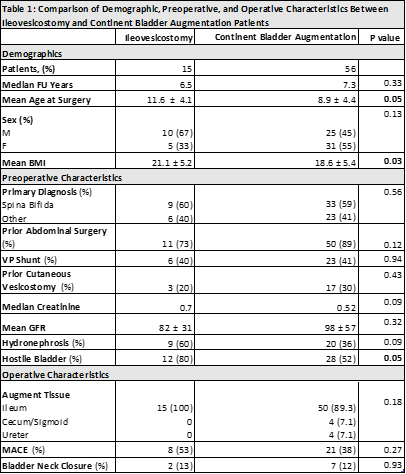Back
Poster, Podium & Video Sessions
Podium
PD02: Pediatric Urology: Neurogenic Bladder, Reconstruction & DSD
PD02-06: Comparison of Long Term Adverse Events and Renal Outcomes Between Ileovesicostomy and Continent Bladder Augmentations at a Single Pediatric Institution
Friday, May 13, 2022
7:50 AM – 8:00 AM
Location: Room 255
Viktor Flores*, Mikhael Matthew, Heidi Chen, Benjamin Abelson, Abby S Taylor, Stacy T Tanaka, Cyrus M Adams, Mark C Adams, John C Thomas, John C Pope 4th, John W Brock 3rd, Douglass B Clayton, Nashville, TN
- VF
Podium Presenter(s)
Introduction: Incontinent ileovesicostomy is a urinary diversion that has historically been offered as an alternative to a continent bladder augmentation (BA) in a subset of pediatric patients with poor bladder compliance and mental, physical, or social barriers to catheterization. Criticisms of ileovesicostomy include higher risk of infection and urolithiasis. We compared the incidence of specific adverse events, total adverse events rate, and renal outcomes between ileovesicostomy and BA. We hypothesize that an ileovesicostomy results in fewer adverse events due to its low-pressure reservoir while achieving similar renal outcomes.
Methods: We conducted a retrospective study of pediatric patients undergoing ileovesicostomy or BA from 2002 to 2021 at our institution. Inclusion criteria included availability of estimated glomerular filtration rate (eGFR) and renal imaging. Renal function was classified according to the stages of chronic kidney disease using eGFR, and hydronephrosis was classified according to the Society of Fetal Urology grading system. Charts were reviewed for adverse events. Chi-square test was performed for all categorical values, and Wilcoxon-test for all continuous variables.
Results: 15 patients with an ileovesicostomy and 56 patients with BA met study criteria. Table 1 summarizes the characteristics between both groups. Postoperative renal function did not differ between ileovesicostomy (P=0.60) or BA (P=0.80) group after surgery based on CKD stage, however SFU hydronephrosis did improve significantly for the ileovesicostomy group (P=0.03) compared to the BA group (P=0.45), with 6 out of 9 patients having resolution after surgery. Total adverse events (0.22 vs. 0.57, P=0.017) per patient year were lower in the ileovesicostomy group. Table 2 shows differences in specific adverse events.
Conclusions: In our data, incontinent ileovesicostomy is a procedure that results in fewer long term adverse events compared to BA, while preserving renal function.
Source of Funding: None


Methods: We conducted a retrospective study of pediatric patients undergoing ileovesicostomy or BA from 2002 to 2021 at our institution. Inclusion criteria included availability of estimated glomerular filtration rate (eGFR) and renal imaging. Renal function was classified according to the stages of chronic kidney disease using eGFR, and hydronephrosis was classified according to the Society of Fetal Urology grading system. Charts were reviewed for adverse events. Chi-square test was performed for all categorical values, and Wilcoxon-test for all continuous variables.
Results: 15 patients with an ileovesicostomy and 56 patients with BA met study criteria. Table 1 summarizes the characteristics between both groups. Postoperative renal function did not differ between ileovesicostomy (P=0.60) or BA (P=0.80) group after surgery based on CKD stage, however SFU hydronephrosis did improve significantly for the ileovesicostomy group (P=0.03) compared to the BA group (P=0.45), with 6 out of 9 patients having resolution after surgery. Total adverse events (0.22 vs. 0.57, P=0.017) per patient year were lower in the ileovesicostomy group. Table 2 shows differences in specific adverse events.
Conclusions: In our data, incontinent ileovesicostomy is a procedure that results in fewer long term adverse events compared to BA, while preserving renal function.
Source of Funding: None



.jpg)
.jpg)